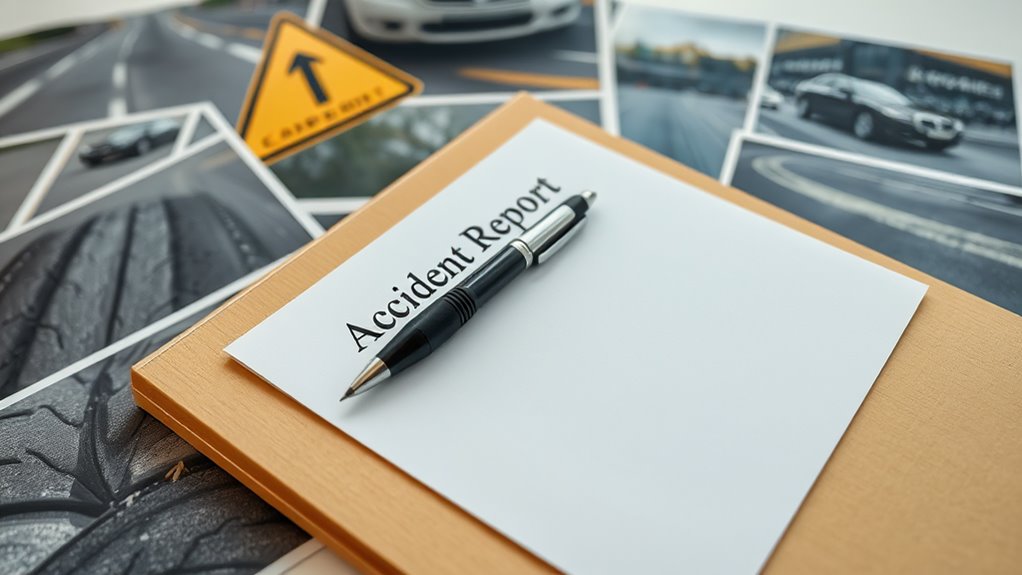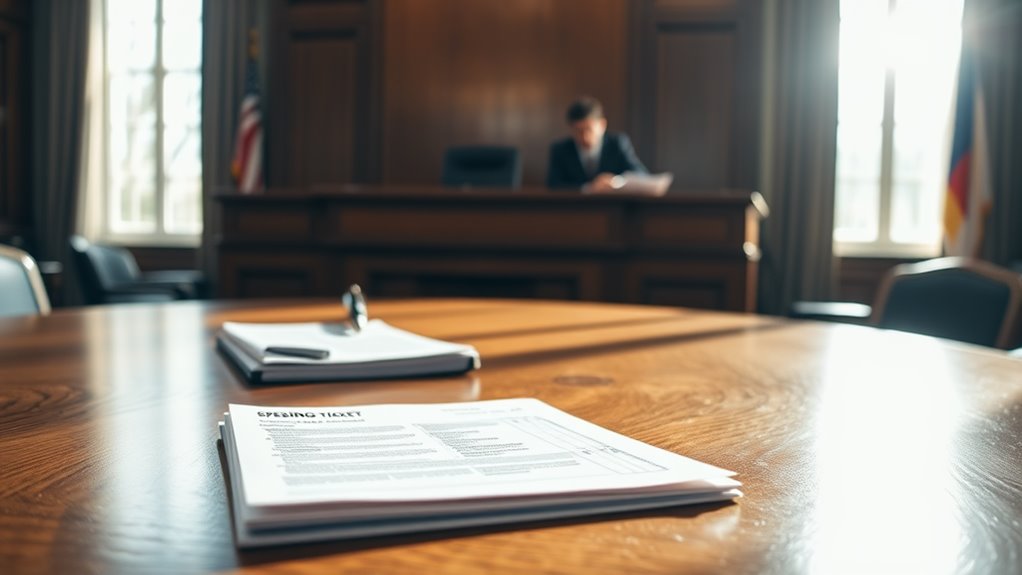7 Essential Tips for Documenting Traffic Accidents
Most people underestimate the importance of thorough documentation after a traffic accident. It's not just about exchanging insurance details; how you capture the scene can greatly impact the outcome of your claim. Knowing the right steps can save you time and stress later. So, what are the essential actions you should take to protect yourself and your interests? Let's explore the key tips that can make all the difference.
Key Takeaways
- Capture wide-angle photos and videos of the accident scene, including vehicles, road signs, and environmental conditions.
- Collect contact and insurance information from all parties involved, ensuring clarity on details like policy numbers and vehicle identifiers.
- Document witness testimonies by obtaining written or recorded statements, focusing on impartial observers who saw the event.
- Record medical evidence of injuries by seeking prompt medical attention and keeping thorough records of all related documents.
- Organize and preserve all documentation in protective folders, categorizing files chronologically and backing them up digitally for easy access.
Capture the Scene With Photos and Videos

How can you effectively document a traffic accident to guarantee all essential details are preserved?
Start by capturing the overall scene with wide-angle shots that include all vehicles involved, road signs, and any debris. Don't forget to record weather conditions and the surrounding environment. Visual documentation preserves evidence of the crash, which can be crucial for future claims. Additionally, having a comprehensive traffic accident report can strengthen your case in negotiations or court.
Next, focus on documenting vehicle damage; take multiple angles of each car, highlighting dents, scratches, and any deployed airbags. Make sure you photograph license plates for identification.
Focus on capturing vehicle damage from various angles, showcasing dents, scratches, and deployed airbags, while also photographing license plates for identification.
Also, record road conditions by photographing damaged barriers or potholes.
For video, narrate clearly, pan slowly, and maintain steady shots. Use high-quality settings, adjust lighting, and enable geolocation for authenticity.
Following these steps will help make certain you have a thorough record of the accident scene.
Collect Contact and Insurance Information
After capturing the scene with photos and videos, the next step is to collect contact and insurance information from everyone involved in the accident.
Gathering this information is essential for any potential claims or legal matters. Make sure you jot down the following details:
- Names, addresses, and phone numbers of all parties
- Insurance provider names and policy numbers
- Vehicle make, model, and license plate numbers
- Driver's license numbers and VINs
Having accurate contact and insurance information will streamline the process of reporting the accident and filing claims.
Don't skip this step, as it can save you a lot of hassle later on. Remember, clarity and completeness now can make a world of difference in resolving any issues down the line.
Document Witness Testimonies
When you're involved in a traffic accident, capturing witness testimonies can greatly bolster your case. Start by politely approaching potential witnesses, such as pedestrians or passengers, ensuring everyone's safety first.
Ask them to provide a written or recorded statement, but remember to obtain their consent before recording. Focus on impartial observers who witnessed the entire event without distractions, as their unbiased accounts hold more weight.
Collect their contact information for future reference and encourage them to sign and date their statements. Don't forget to inform the police about these testimonies, so they can be included in the official report.
Clear communication and professionalism are key to preserving the integrity of each witness's account.
Record Medical Evidence of Injuries

Recording medical evidence of injuries is essential for building a solid case after a traffic accident, as it directly links your injuries to the incident.
To strengthen your claim, focus on the following:
- Seek prompt medical attention to document any injuries immediately.
- Collect all medical documents, including reports and prescriptions, to provide a thorough record.
- Communicate with healthcare providers about how injuries relate to the accident for accurate documentation.
- Follow treatment plans to guarantee consistency and legitimacy in your recovery process.
Follow Safety and Legal Procedures
Following a traffic accident, it's crucial to prioritize safety and adhere to legal procedures.
First, turn on your hazard lights to alert other drivers. If possible, move your vehicle to a safe location to prevent further accidents. Use road flares or warning triangles to enhance visibility.
If you can't move your vehicle, stay inside and wait for assistance, avoiding any electrical wires nearby. Always contact emergency services if there are injuries and notify the police, even for minor incidents, to obtain an official report.
Collect information from all parties involved, including names, insurance details, and witness statements. Document the scene with photos, noting time, location, and weather conditions.
Seek Legal Representation
Although managing the aftermath of a traffic accident can be overwhelming, seeking legal representation is essential to protect your rights and secure the compensation you deserve. A skilled attorney can provide invaluable support in steering through this complex process.
Here are some key benefits of hiring a lawyer:
- Expertise: They understand car accident laws, ensuring you don't miss critical details.
- Maximizing Compensation: Legal representation often leads to higher settlement amounts.
- Avoiding Mistakes: Lawyers help you avoid pitfalls like accepting low offers.
- Negotiation Skills: They handle discussions with insurers, advocating for your best interests.
With their guidance, you can focus on recovery while they manage the legal intricacies of your case, giving you peace of mind and the best chance for a favorable outcome.
Organize and Preserve All Documentation

To effectively navigate the aftermath of a traffic accident, organizing and preserving all relevant documentation is essential. Start by using dedicated accordion files or binders to store your documents, placing originals in protective sleeves. Make copies and categorize them chronologically.
Digitally, create a structured folder system on your computer, using consistent naming conventions and backing up files to secure cloud storage. Don't forget to scan paper documents for extra safety.
Track timelines of key events, including the accident date, police arrival, and medical appointments. Finally, protect sensitive information with password security and guarantee the integrity of your evidence.
Conclusion
In summary, documenting a traffic accident is about capturing details, collecting information, and preserving evidence. By taking photos, gathering contacts, and recording witness accounts, you build a strong foundation for your case. By seeking medical attention and legal guidance, you protect your rights and well-being. Finally, by organizing your documentation, you guarantee that nothing gets overlooked. So remember, thorough documentation today can lead to a smoother resolution tomorrow. Don't leave your future to chance—act wisely and be prepared.














